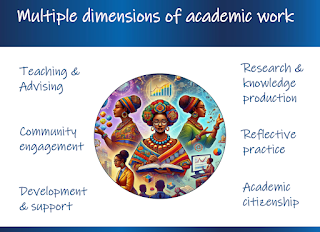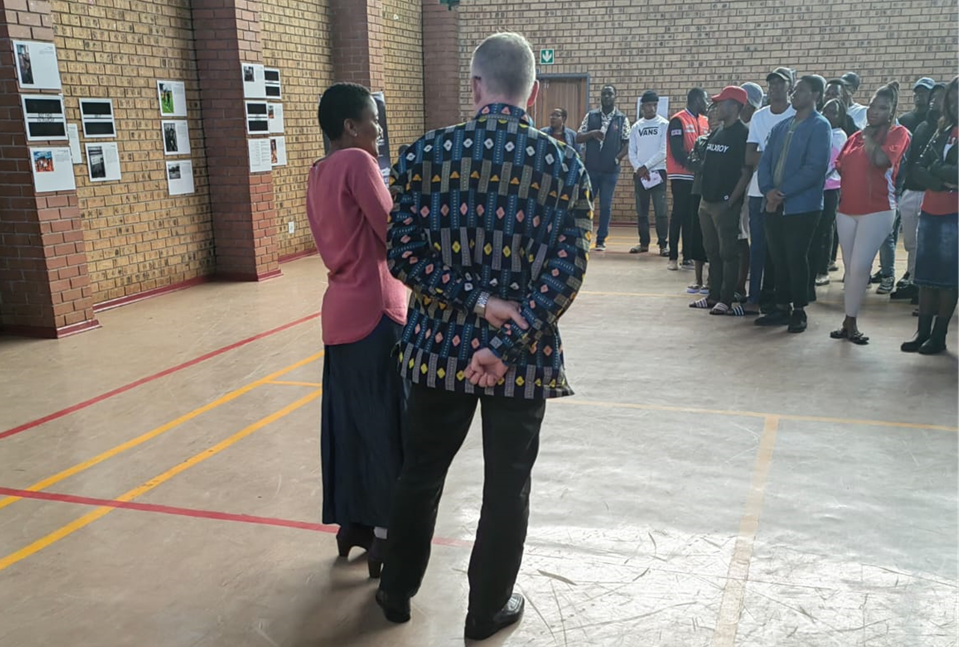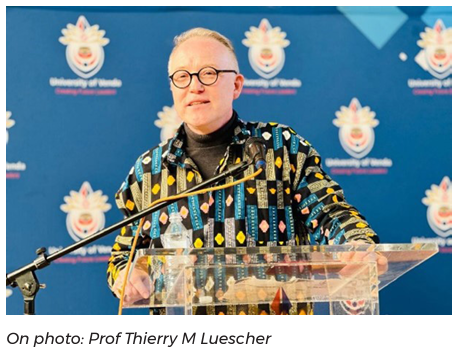Anye and I drafted a preface for the forthcoming book:
#FeesMustFall ten years on
which is co-edited by Anye Nyamnjoh, Thierry Luescher, Josh Platzky-Miller, Keamo Morwe and Simamkele Dlakavu, to be published in 2026 by Mandela University Press. The final version of the Preface, which still needs to be reviewed, amended and approved by the other three editors, will eventually become the Preface of the book. Here is a glimpse behind the scenes of the forthcoming book.
PS. I love the picture from 2015 of the school kids urging the university students to "keep fighting". I wonder where they are now. Ten years on... they have hopefully long joined higher education or gained some other way a vocational qualification, and started their own businesses or found great jobs. (PPS. If you know who took this picture or who is in it, please let me know.)
Draft Preface
This book began, as many books about social movements do, not with quiet scholarly contemplation or an accumulation of data and ideas, but with questions and commitments that refused to settle.
Ten years after the South African student spring of 2015–16, questions lingered like: What has been the impact of this student generation’s sacrifices? What has changed? And perhaps most pressingly: what has not? How do we keep the memory alive? How do we introduce a new generation of students and activists— and remind scholars, academic leaders, policy makers and the public— to the ideas and politics of that time?
 Between 2015 and 2017, South African higher education was engulfed by a wave of student protests that travelled across campuses and beyond them, carrying hashtags as names that became both slogans and archives: #RhodesMustFall, #FeesMustFall, #EndOutsourcing, #PatriarchyMustFall. These were not only movements and campaigns about fees, statues and policies. They were moments in which the university itself — its histories, cultures, promises, and manifestations— were profoundly contested and reframed as violences, exclusions, and trauma. Students gave language to what many had long felt but struggled to name: that the post-apartheid university remained tethered to coloniality, racial capitalism, patriarchy, and epistemic hierarchy. Studying in the post-apartheid university was experienced as ‘black pain’. And this crisis was neither abstract nor episodic; it was personal and structural.
Between 2015 and 2017, South African higher education was engulfed by a wave of student protests that travelled across campuses and beyond them, carrying hashtags as names that became both slogans and archives: #RhodesMustFall, #FeesMustFall, #EndOutsourcing, #PatriarchyMustFall. These were not only movements and campaigns about fees, statues and policies. They were moments in which the university itself — its histories, cultures, promises, and manifestations— were profoundly contested and reframed as violences, exclusions, and trauma. Students gave language to what many had long felt but struggled to name: that the post-apartheid university remained tethered to coloniality, racial capitalism, patriarchy, and epistemic hierarchy. Studying in the post-apartheid university was experienced as ‘black pain’. And this crisis was neither abstract nor episodic; it was personal and structural.
As the tenth anniversary approached, organising a commemorative event felt insufficient.. We were not interested in toasting to the student struggles or nostalgically domesticating what had been deeply disruptive and immensely generative. We wanted to contribute to a critical reckoning: a collective effort to critically think through the movement and its various manifestations— its histories, meanings; its impact, legacy and significance.
The first seeds for this book were planted in conversation and collaboration across institutions and networks of scholars, practitioners, and former activists who had lived through the protests in different roles. A colloquium convened under the broad rubric of rupture and decolonisation created a space to revisit the moment not as a closed chapter but as an unfinished process. From these exchanges of ideas and research came the call for contributions that anchored this book.
We invited scholars, higher education practitioners, former student leaders and activists to reflect on the 2015–16 moment and its aftermath. We deliberately opened up the space for different genres and methods. Research articles sit alongside personal narratives, visual essays, and reflective accounts. In this way, the book mirrors the movement itself: polyphonic, contested, networked, and internally differentiated. The knowledge produced in and about the movement both reflects and challenges the confines of conventional academic form.
Some contributors write with analytic distance, producing rigorous empirical and policy analyses. Others draw on the immediacy of lived experience.. Some trace policy trajectories and institutional reforms while others recall solidarity, care and trauma. Together, these contributions render the student movement as a complex social formation: uneven, contradictory, generative and creative.
Historically, this volume reflects on a moment when the language of “transformation,” dominant in post-1994 higher education policy, had lost much of its critical purchase. . The students’ insistence on “decolonisation” signalled deep dissatisfaction with compromise, incremental reform and managerial rationale. Decolonisation named new and deeper questions: Who belongs in the university? Who does the university belong to? Who and what is missing from the canons and corridors of the university? Who pays and who benefits? Decolonisation brought new concepts into the South African academic discourse and linked old and new demands: like epistemic justice and material redress. In unsettling the post-apartheid moral grammar of the public university, the movement exposed tensions at the heart of the post-apartheid elite compact.
Intellectually, the movement drew on a wide repertoire, including most prominently its “official” three ideological pillars, i.e., Black Consciousness, Pan-Africanism, and Black Radical Feminism, alongside South African Charterism, queer theory, decolonial thought, Marxism, labour struggles, and longstanding traditions of student and worker solidarity. These traditions did not always cohere comfortably. Campus-based movements and the broad national campaigns were at once local and translocal, digitally networked and physically embodied, rooted in specific positionalities and yet resonant far beyond them. The #MustFall ideas thus travelled across sectors, borders, and domains with the university as the nuclear site where broader social conflicts crystallised.
If the 2015-16 student movement opened possibilities, it also exposed its limits: gains were uneven and incomplete; institutions adapted; securitisation intensified; dissent was suppressed; debate was polarised; internal fissures emerged; fatigue and trauma setting in.
The question of legacy, impact, and significance is therefore not simple. Yet answers may lie in looking back afresh, in critically interrogating the present, and in asking what political and intellectual imaginaries the movement made possible over the past decade — and what they might still make possible. This book is the space we created for questions to be asked, probed, and perhaps answered. If it achieves anything, we hope it does so in refusing both celebration and condemnation, and in continuing the work of understanding as part of the work of social change.



















